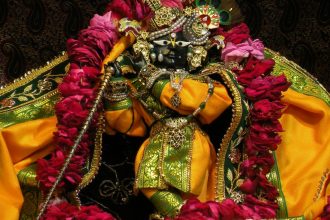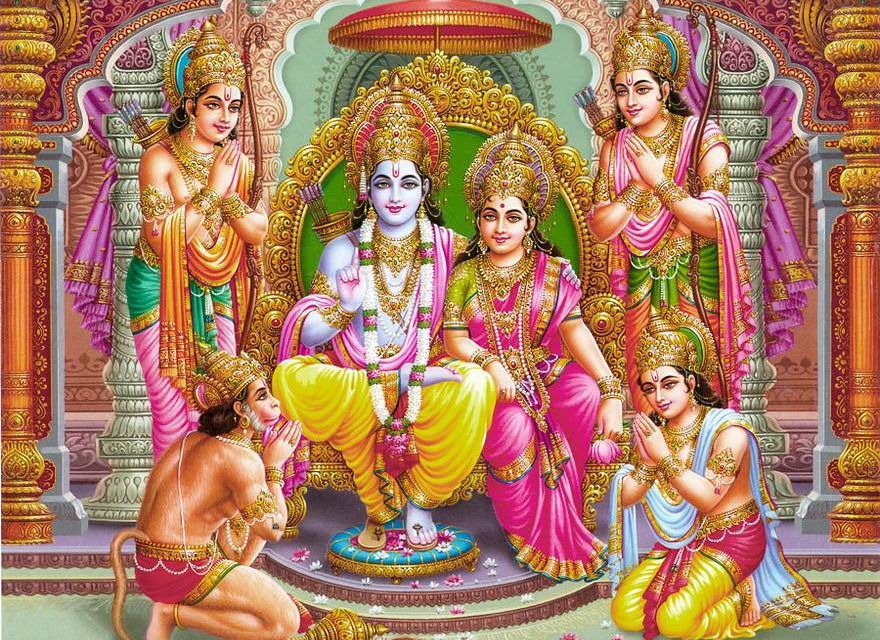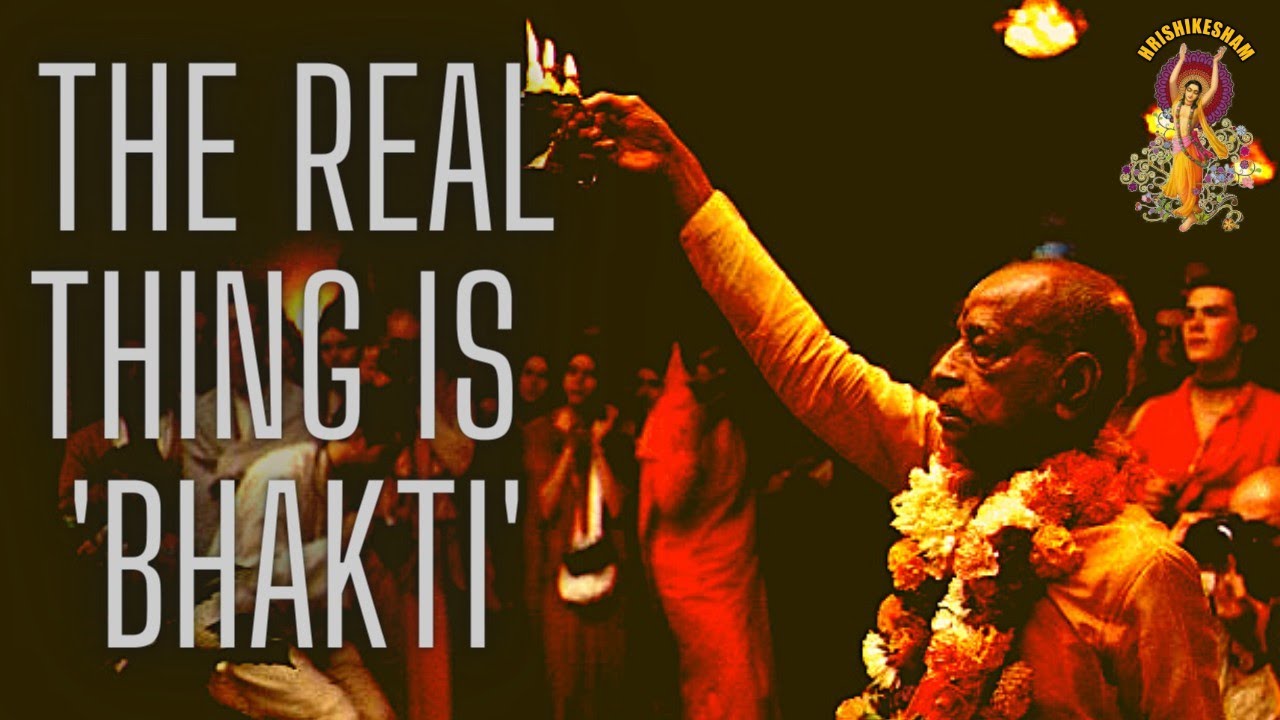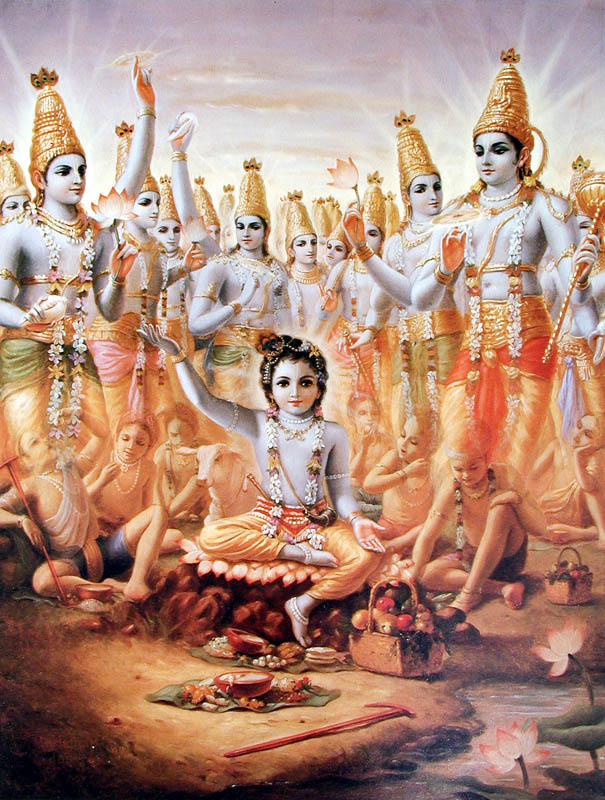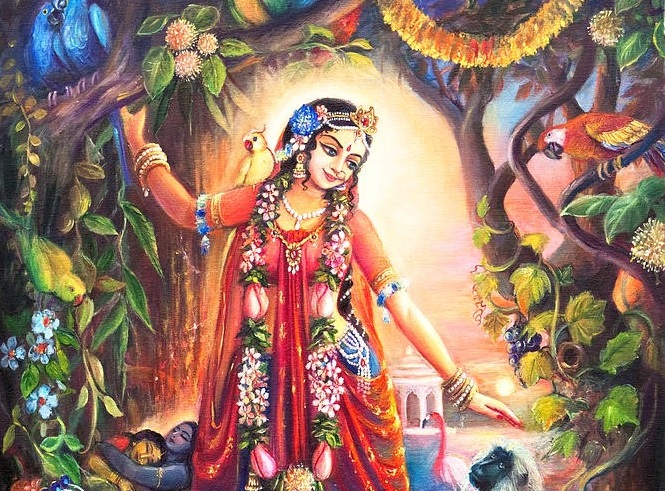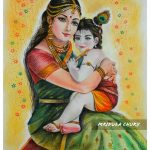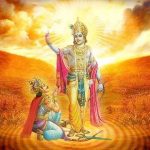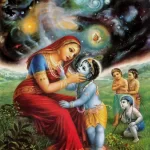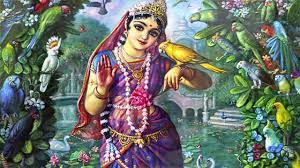The demigods returned to Lord Śiva and sought refuge in him. Disturbed, they cried out, “O Lord, please save us! Save us!”
Lord Śiva, noting the demigods’ defeat and hearing their fearful cries, became greatly enraged. Glancing at the demigods sympathetically, he assured them of his protection. He ordered his son, the great hero Kārttikeya, to attack the enemy. Fighting courageously with the hosts of demons, Kārttikeya shouted angrily and roared heroically, killing one hundred akṣauhiṇīs in the battle. Then Kālī, her eyes like a red lotus, chopped off their heads, drank their blood, and rapidly ate their flesh. She fought in many ways, frightening both the demigods and the demons. Wherever she went, she drank the Dānavas’ blood. With one hand she grabbed ten million elephants and ten million men and playfully shoved them into her mouth. Thousands of headless bodies appeared to be dancing on the battlefield. All the cowards were terrified by the overwhelming tumult.
Kārttikeya again became furious. Showering countless volleys of arrows, he struck thousands of demon leaders within a few seconds. Terrified, many of the Dānavas fled, but those who stayed were slain. The demons Vṛṣaparvan, Vipracitti, Daṇḍa and Vikampana fought with Kārttikeya by turns, and all of them were wounded by his spear. Kālī assisted Kārttikeya, and together they won the battle. In the heavens, the celestials pounded their drums and showered down flowers. Śaṅkhacūḍa saw the appalling spectacle wrought by Kārttikeya and Kālī; it appeared as terrible as the final dissolution of the world. Furious, he prepared for battle. Accompanied by many heroes, he climbed into his diamond-studded airplane, which was equipped with weapons and missiles. This enlivened and encouraged his men, especially when Śaṅkhacūḍa, sitting in the middle of the plane, drew his bowstring to his ear and discharged volleys of arrows. The shafts were terrifying and could not be endured. They resembled a shower of rain and covered the battlefield with intense darkness, relieved only by occasional flashes of fire.
At this, Nandīśvara and the other demigods fled, however, Kārttikeya stayed. Then the Dānava king showered mountains, serpents, pythons and trees so horrendously that they could not be resisted. Thus Kārttikeya looked like the sun covered by thick sheets of frost. Śaṅkhacūḍa broke Kārttikeya’s car, cut to pieces his bow, chariot and horses, and shattered his peacock carrier. Then he hurled his effulgent spear at Kārttikeya’s chest, and the force of the blow caused him to fall unconscious.
Quickly regaining consciousness, Kārttikeya mounted his sturdy, bejeweled chariot, took up his weapons and missiles and fought awesomely. Using his mystic weapons, he furiously split the weapons that had been hurled at him, namely, the serpents, mountains, trees and rocks. Then he put out a fire with his water weapon, split apart the demon’s bow and chariot, and killed his charioteer. Roaring and shouting repeatedly like a hero, he split Śaṅkhacūḍa’s armor and crown, and then hurled his blazing spear at the demon’s chest. Śaṅkhacūḍa collapsed unconscious.
But within a second that powerful asura regained consciousness and, with the strength of a lion, got up and roared. The demon grabbed another bow and more arrows and mounted another chariot. Foremost in the use of mystic powers, the demon caused a tremendous downpour of arrows on Kārttikeya that completely enshrouded him. Then the demon grabbed an invincible iron spear, which was filled with Lord Viṣṇu’s energy; it was radiant like a hundred suns and looked like the vast fire that occurs at the end of the world. Śaṅkhacūḍa hurled it at Kārttikeya and it hit him with the impact of a massive fireball, causing him to drop unconscious.
Kālī immediately went to him, lifted her son to her breast and carried him to Lord Śiva. By virtue of his deep knowledge, Lord Śiva revived Kārttikeya and endowed him with inexhaustible strength. He then got up full of vigor but remained guarded by Lord Śiva.
Kālī, followed by Nandīśvara, the Gandharvas, the Yakṣas, the Rākṣasas and the Kinnaras, returned to the battlefield. Hundreds of war drums were pounded and hundreds of persons carried wine. When Kālī began to roar like a lioness, the demons fainted. Seeing this, she burst into cackles of laughter repeatedly, boding ill to the asuras. Then Kālī drank wine and danced on the battlefield, and the Yoginīs, Ḍākinīs and the demigods also drank, roaring and reveling.
When Śaṅkhacūḍa saw Kālī, he hastened to the field. Though his men were frightened by her, he assured them of his protection.
Kālī then hurled a fire weapon and it shot over the field like the fire that manifests when the world is about to come to an end. But the king shot a water weapon at it and quickly extinguished it. Kālī hurled the varuṇa weapon at him but he baffled it with the Gāndharva weapon. Kālī threw the Māheśvara weapon, but he destroyed it with his Vaiṣṇava weapon. Then, after uttering some mantras, Kālī discharged the Nārāyaṇa weapon. Seeing it coming at him, the king jumped off his chariot and bowed down to it, causing the weapon to zoom upwards like the fire of final dissolution. The demon, full of devotion, fell prostrate on the ground. The goddess recited a mantra and hurled a brahmāstra at him, but he baffled it with his own brahmāstra. Then she threw a weapon at him that was eight miles long, but Śaṅkhacūḍa cut it to pieces with his celestial weapon.
Infuriated, the demon discharged celestial missiles at the goddess but she merely opened her mouth wide, swallowed them and roared with loud laughter. This terrified the demons. Śaṅkhacūḍa then hurled a weapon at her that was eight hundred miles long, but she shattered it into a hundred pieces with celestial missiles. He flung the Vaiṣṇava missile at the goddess, but she blocked it with a Māheśvara missile.
The fight continued for a long time and all the demigods and demons stood watching it.
Kālī was now infuriated. Just as she readied herself to throw the pāśupata weapon, a heavenly voice from the sky cried out, “O Goddess! Do not throw this missile at Śaṅkhacūḍa. So long as Lord Hari’s amulet remains on his neck and his wife’s chastity is not violated, the king cannot be killed-even by the never-failing pāśupata weapon. Lord Brahmā gave him this boon.” Kālī heeded the voice and desisted from hurling the weapon. But out of hunger she devoured millions of demons. She then hastened to devour Śaṅkhacūḍa but he resisted her with his sharp celestial weapons. She next aimed a scimitar at him that flashed like the noonday sun but the king cut it to pieces. So she ran after him to swallow him. But the skillful demon prevented her by expanding his body.
Highly enraged, the dreadful goddess smashed his chariot, killed his charioteer, and hurled a terrible spear at him-one that looked like the awesome fire that occurs when the world is about to end. But the king caught it with his left hand. The goddess then angrily struck him with her fists and caused the demon enough pain to make him reel and fall unconscious for a moment. Regaining consciousness, he got up, but he would not engage in hand-to-hand combat with Kālī. Rather, he bowed down to her.
The goddess then threw other weapons at Śaṅkhacūḍa, but he partly cut them down and partly took them up and absorbed them, rendering them futile. Regarding her as his mother, he did not aim any weapons at her. Then Kālī caught hold of him, whirled him around repeatedly and angrily flung him into the sky. The demon came down with a tremendous crash, but he immediately got up and bowed to the goddess. Next, he gladly climbed up onto another stunning jeweled chariot and, feeling no fatigue at all from the battle, continued fighting.
Then Kālī, feeling hungry, began drinking the blood and eating the fat and flesh of the demons. After this the goddess returned to Lord Śiva and described to him in detail the progression of the war-from beginning to end. Hearing about the demise of the demons, Lord Śiva laughed. Kālī remarked that the only demons alive were the ones who crawled out of her mouth while she was chewing them, which amounted to about one hundred thousand. “And when I took hold of the pāśupata weapon to kill Śaṅkhacūḍa, an invisible celestial voice cried, ‘He cannot be killed by you.’ Then the powerful demon stopped hurling weapons at me. All he did was shatter those which I hurled at him.”


